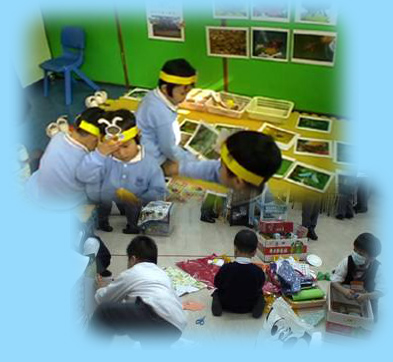 |
 |
| |
Selected Research Project |
| |
 |
| Project Title |
Enhancing the Quality of Learning and Teaching in Hong Kong Early Childhood Education: Meeting the Challenges of the New Policy |
|
| |
| Principal Investigator |
Dr. Cheng Pui Wah, Doris |
|
| |
| Area of Research Project |
Public Policy Studies |
|
|
|
|
| |
| Project Period |
|
|
| Objectives |
In 1986, the Hong Kong government adopted play as a central learning and teaching pedagogy in early childhood education (ECE), with a view towards altering the prevailing traditional teacher-centred practice. However, an implementation gap continued to be repeatedly identified in the government’s quality assurance inspection reports, as well as by local research. In 2007, the Chief Executive of Hong Kong committed HK$2 billion to enhance the quality of ECE by introducing the
Pre-primary Education Voucher Scheme (PEVS). The current study is focused on identifying the root causes of the gap that exists between the official expectations of quality pedagogy and the day-to-day practice in Hong Kong classrooms. The purpose of this investigation is to support and carry forward the current policy initiative, PEVS, by ensuring the effective use of government funds allocated to quality ECE. Its main objectives/questions are as follows: |
| |
-
What root causes of the gap between official expectations of child-centred play-based and teacher-centred pedagogies are consistently observed in quality assurance inspection reports?
-
What are the best practices of child-centred, play-based pedagogy in Hong Kong?
-
How can pre-primary schools make the best use of the funds allocated to enhance the quality of teaching and learning in ECE?
|
|
 |
|
| Methods Used |
This project employs qualitative methods using a multi-site approach. Such approach draws upon the in-depth benefits of case-study methodology. According to Shulman (1998), a case resides in the territory between theory and its practice, between idea and experience, and is capable of capturing pieces of experience that initially existed solely within the life of a single individual and of transforming that solitary experience into text. Thus, this approach has the power to uncover the cause of the identified implementation embedded in the field. Multi-site research enables researchers to compare and contrast situations from one setting to the next. Thus, it allows generalizations among the exemplars to theorize means for a child-centred, play-based practice in the Hong Kong preschools.
For data collection, this project used school visits and classroom observations in the form of video and audio recording of the teaching and learning process, as well as interviews of teachers, principals, and parents, in order to collect comprehensive data. All the interviews and audio recordings were then transcribed. The video clips were reviewed, and the duration of each session was noted. Together with the video clips, a comprehensive dataset for each school was collated into a package to prepare the researchers to conduct an initial analysis. Each of the investigators then analyzed his or her own data according to an agreed template. With the help of Nvivo, discourse analysis, as well as discussions within the team, the data were then coded according to the emerging features and the results were analyzed. |
| Summary of Findings |
The findings revealed the embedded issues involved in child-centred, play-based practice in this region as follows: |
-
Eighteen out of the 20 sample pre-primary institutions in Hong Kong adopted the commercial curriculum packages; thus, uniform practices in the form of “teacherly play” were identified in most of the sample schools.
-
Hypothetical barriers to realizing play in the classroom, such as the urge to follow a rigid timetable to cover all the pre-designed content set down in those packages, were identified. Children’s learning was hurried and, inevitably, a teacher-dominated practice was found.
-
Mismatches of communication amongst the key stakeholders were identified as frontline teaching professionals who perceived parents as the main obstacle to implementing play in the curriculum.
- playfulness episodes were identified as local exemplars of play-based practice. The features devised from these episodes can support the government in formulating context-sensitive guidelines and effective strategies for pre-primary institutions to carry out developmentally appropriate quality practices for young children in Hong Kong.
|
|
| Impacts |
The identification of factors that facilitate and impede play-based practices, such as the mismatches of communication amongst the key ECE stakeholders, the insensitivity of teachers towards the children’s playfulness, and the obsession of physical resources in implementing play in classroom can help the government understand the phenomenological complexity and to formulate effective strategies and guidelines for quality learning and teaching in this region. Moreover, the revelation of exemplar play-based practices in our context can help the government design context-sensitive criteria of play-based practice for its quality assurance inspection exercise. Actually, after reading the 3 interim reports, the Principal Inspector (Kindergarten) of the Quality Assurance Inspection section of the Hong Kong Government Education Bureau responded by email on April 30, 2010, stating that follow-up actions on the recommendations have been accomplished. Finally, the result of the project pointed to the need of a research-based policy initiative that can assist government to design its research agenda when reviewing and formulating the future subsidize model in ECE.
|
Selected Publications Related to the Study |
-
Fung, C. K. H., & Cheng, P. W. D. (In press). Consensus or dissensus? Stakeholders’ views on the role of play in learning. Early Years: An international journal of research and development.
-
Cheng, P. W. D., Fung, C. K. H., Benson, P., & Lau, G. (2010). Exemplars of best practices and guidelines for child-centred, play-based pedagogy in Hong Kong: Making a difference to quality early childhood education (Report No. 3). Hong Kong: Hong Kong Institute of Education, Department of Early Childhood Education.
-
Cheng, P. W. D., Fung, C. K. H., Benson, P., & Lau, G. (2009). Play-based pedagogy in early childhood classrooms in Hong Kong and its impact on quality education (Report No. 2). Hong Kong: Hong Kong Institute of Education, Department of Early Childhood Education.
-
Cheng, P. W. D., Fung, C. K. H., Benson, P., & Lau, G. (2008). The implementation of play-based pedagogy: Views from Hong Kong and international perspectives (Report No. 1). Hong Kong: Hong Kong Institute of Education, Department of Early Childhood Education.
|
Biography of Principal Investigator |
Dr. Cheng is the Associate Professor and the Director of the Centre for Childhood Research and Innovation. She has been serving in the early childhood teaching education for twenty years, which has given her extensive knowledge in the field. She was awarded a merit of the Distinguished Teacher Award in 1998. Dr. Cheng's research interest is on the learning and teaching of young children, especially on the enactment of “learning through play.” She has published in international referee journals and book chapters in this area. Recently, Dr. Cheng successfully applied for Public Policy Research funding to work on the quality of implementing "play" in Early Childhood Education in the Hong Kong context. She is also committed to international discourse on enhancing the quality of "play-based pedagogy" and has collaborated with international scholars in the application of GRF on a comparative study on “children’s perspectives on play and learning.” In addition, she has been working on book chapters in the Handbook of Play and Learning.
|
Funding Source |
| Public Policy Research |
|
|
|
 |
|
 |


